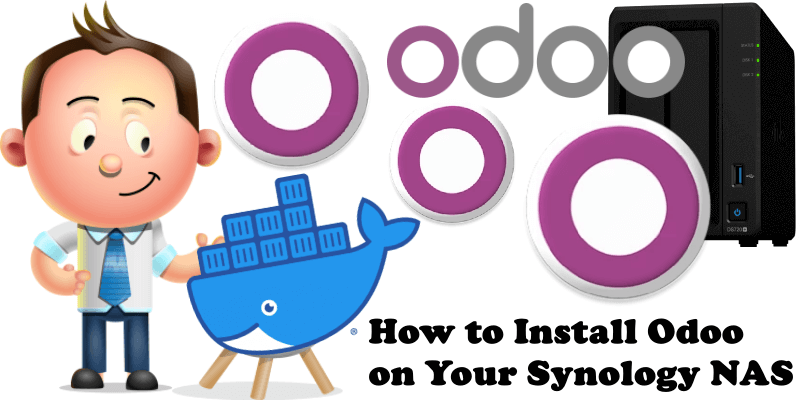
Odoo is a suite of open source business apps that cover all your company needs: CRM, eCommerce, accounting, inventory, point of sale, project management etc. In this step by step guide I will show you how to install Odoo on your Synology NAS using Docker & Portainer.
STEP 1
Please Support My work by Making a Donation.
STEP 2
Install Portainer using my step by step guide. If you already have Portainer installed on your Synology NAS, skip this STEP. Attention: Make sure you have installed the latest Portainer version.
STEP 3
Make sure you have a synology.me Wildcard Certificate. Follow my guide to get a Wildcard Certificate. If you already have a synology.me Wildcard certificate, skip this STEP.
STEP 4
Go to Control Panel / Login Portal / Advanced Tab / click Reverse Proxy. Follow the instructions in the image below.
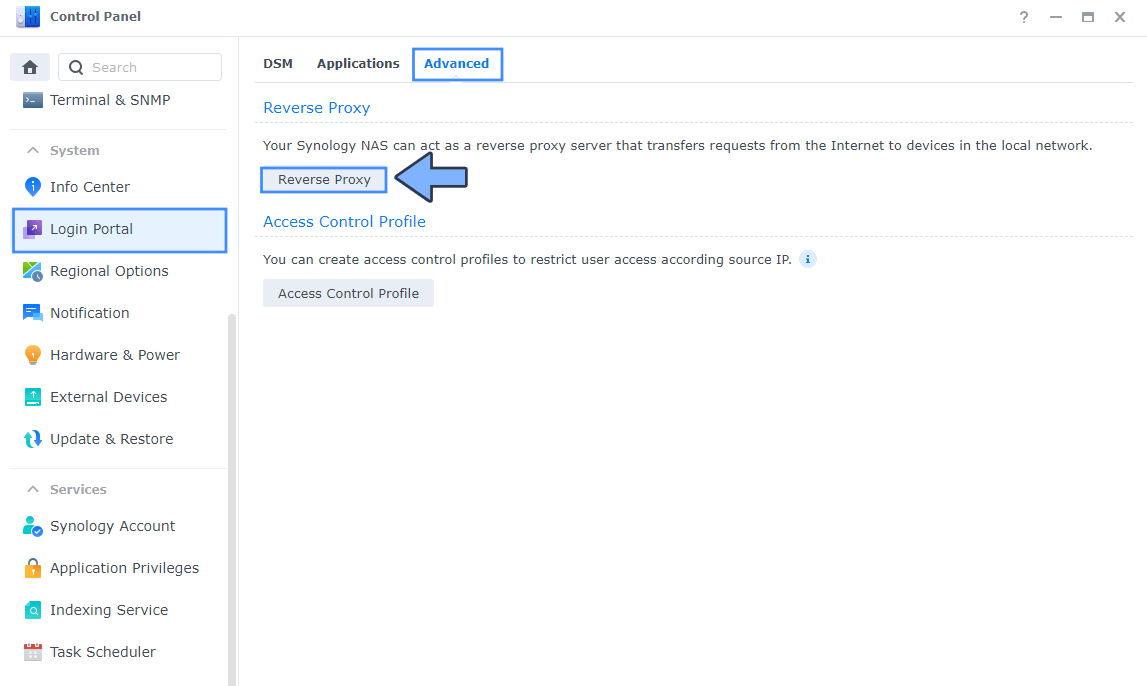
STEP 5
Now click the “Create” button. Follow the instructions in the image below.
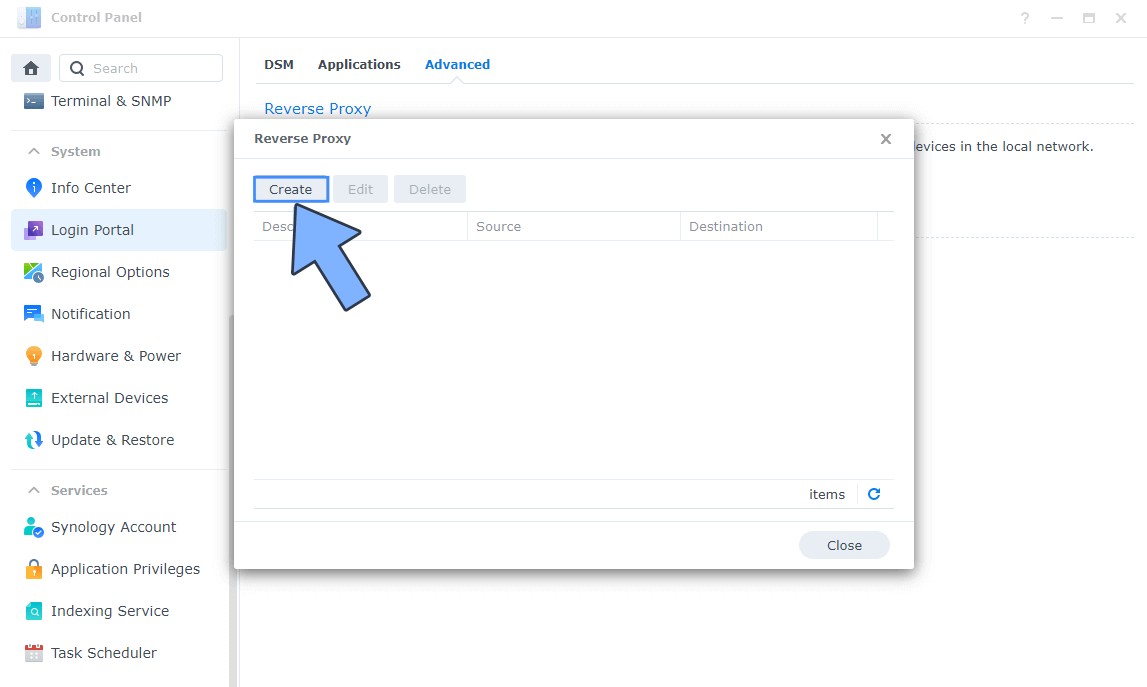
STEP 6
After you click the Create button, the window below will open. Follow the instructions in the image below.
On the General area, set the Reverse Proxy Name description: type in Odoo. After that, add the following instructions:
Source:
Protocol: HTTPS
Hostname: odoo.yourname.synology.me
Port: 443
Check Enable HSTS
Destination:
Protocol: HTTP
Hostname: localhost
Port: 8069
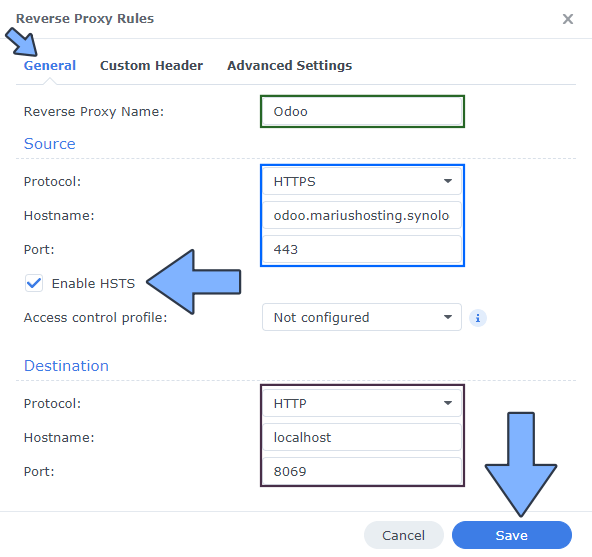
STEP 7
On the Reverse Proxy Rules click the Custom Header tab. Click Create and then, from the drop-down menu, click WebSocket. After you click on WebSocket, two Header Names and two Values will be automatically added. Click Save. Follow the instructions in the image below.

STEP 8
Go to Control Panel / Network / Connectivity tab/ Check Enable HTTP/2 then click Apply. Follow the instructions in the image below.
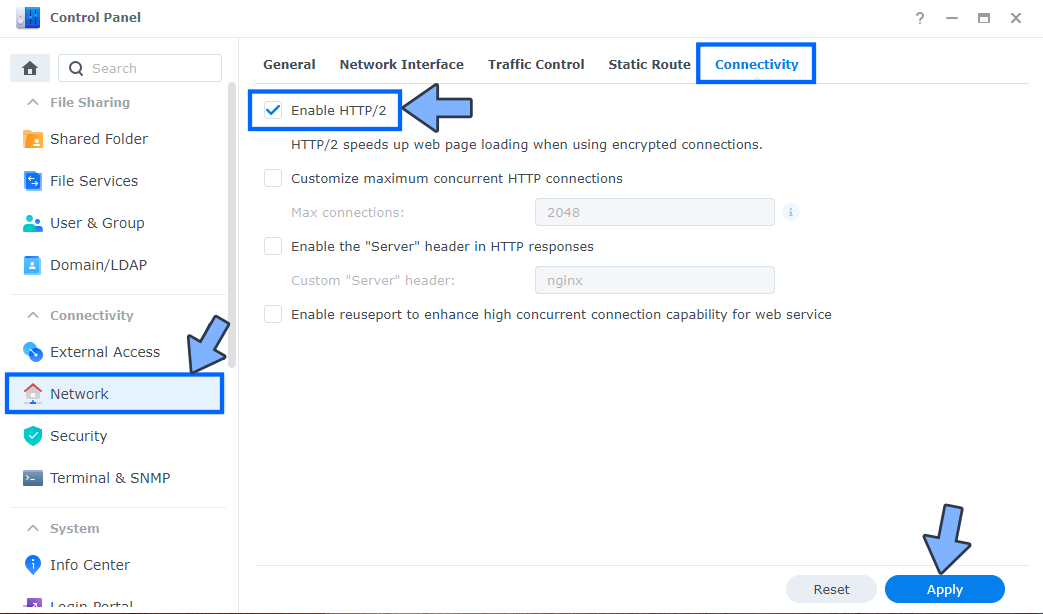
STEP 9
Go to Control Panel / Security / Advanced tab/ Check Enable HTTP Compression then click Apply. Follow the instructions in the image below.
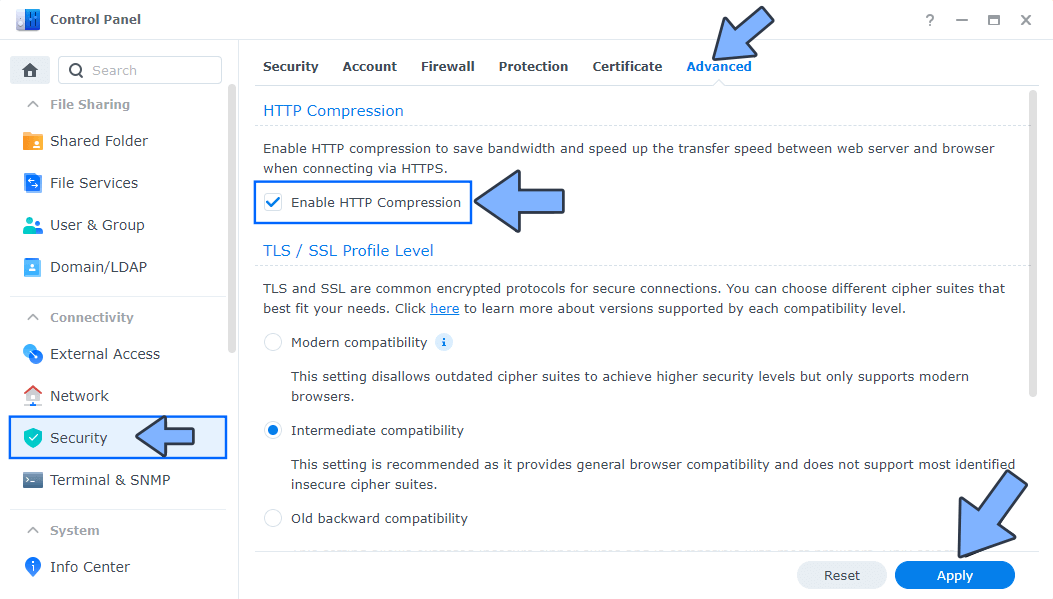
STEP 10
Go to File Station and open the docker folder. Inside the docker folder, create one new folder and name it odoo. Follow the instructions in the image below.
Note: Be careful to enter only lowercase, not uppercase letters.
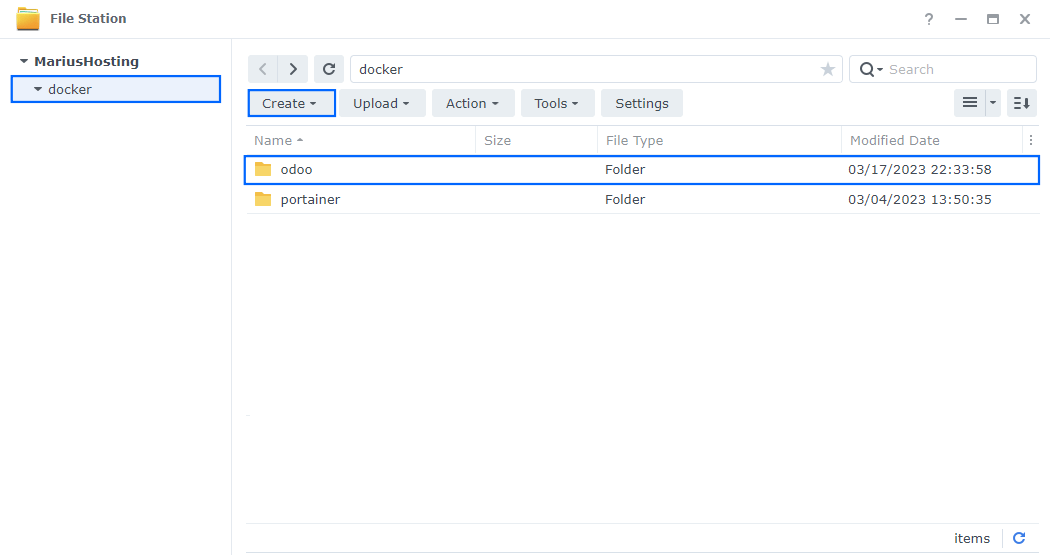
STEP 11
Now create five new folders inside the odoo folder that you created at STEP 10 and name them addons, cache, db, local, web-data. Follow the instructions in the image below.
Note: Be careful to enter only lowercase, not uppercase letters.
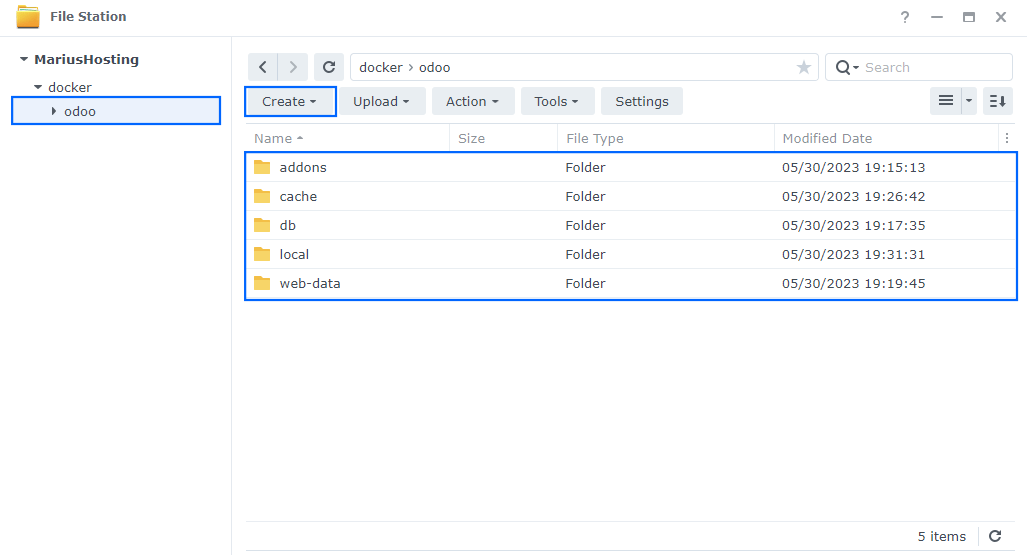
STEP 12
Log into Portainer using your username and password. On the left sidebar in Portainer, click on Home then Live connect. Follow the instructions in the image below.

On the left sidebar in Portainer, click on Stacks then + Add stack. Follow the instructions in the image below.

STEP 13
In the Name field type in odoo. Follow the instructions in the image below.
services:
db:
image: postgres:17
container_name: Odoo-DB
hostname: odoo-db
security_opt:
- no-new-privileges:true
healthcheck:
test: ["CMD", "pg_isready", "-q", "-d", "postgres", "-U", "odoouser"]
timeout: 45s
interval: 10s
retries: 10
volumes:
- /volume1/docker/odoo/db:/var/lib/postgresql/data:rw
environment:
POSTGRES_DB: postgres
POSTGRES_USER: odoouser
POSTGRES_PASSWORD: odoopass
restart: on-failure:5
odoo:
image: odoo:19
container_name: Odoo
hostname: odoo
security_opt:
- no-new-privileges:true
user: 0:0
healthcheck:
test: curl -f http://localhost:8069/ || exit 1
ports:
- 8069:8069
volumes:
- /volume1/docker/odoo/web-data:/var/lib/odoo:rw
- /volume1/docker/odoo/addons:/mnt/extra-addons:rw
- /volume1/docker/odoo/cache:/.cache/pip:rw
- /volume1/docker/odoo/local:/.local:rw
# - /volume1/docker/odoo/config:/etc/odoo:rw
# only need for special configurations
# https://github.com/odoo/docker/blob/master/19.0/odoo.conf
environment:
HOST: odoo-db
PORT: 5432
USER: odoouser
PASSWORD: odoopass
depends_on:
db:
condition: service_healthy
restart: on-failure:5
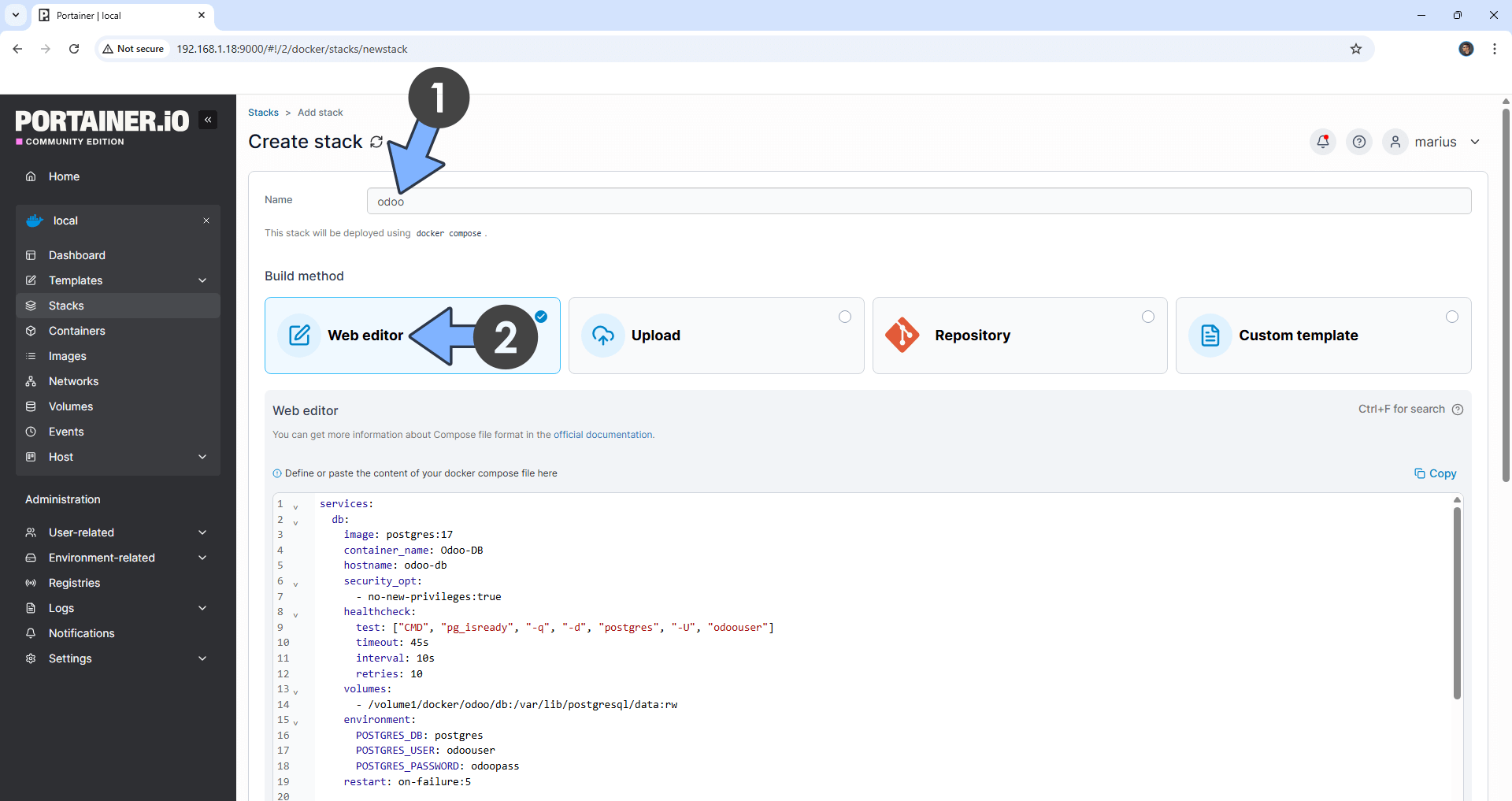
STEP 14
Scroll down on the page until you see a button called Deploy the stack. Click on it. Follow the instructions in the image below. The installation process can take up to a few minutes. It will depend on your Internet speed connection.
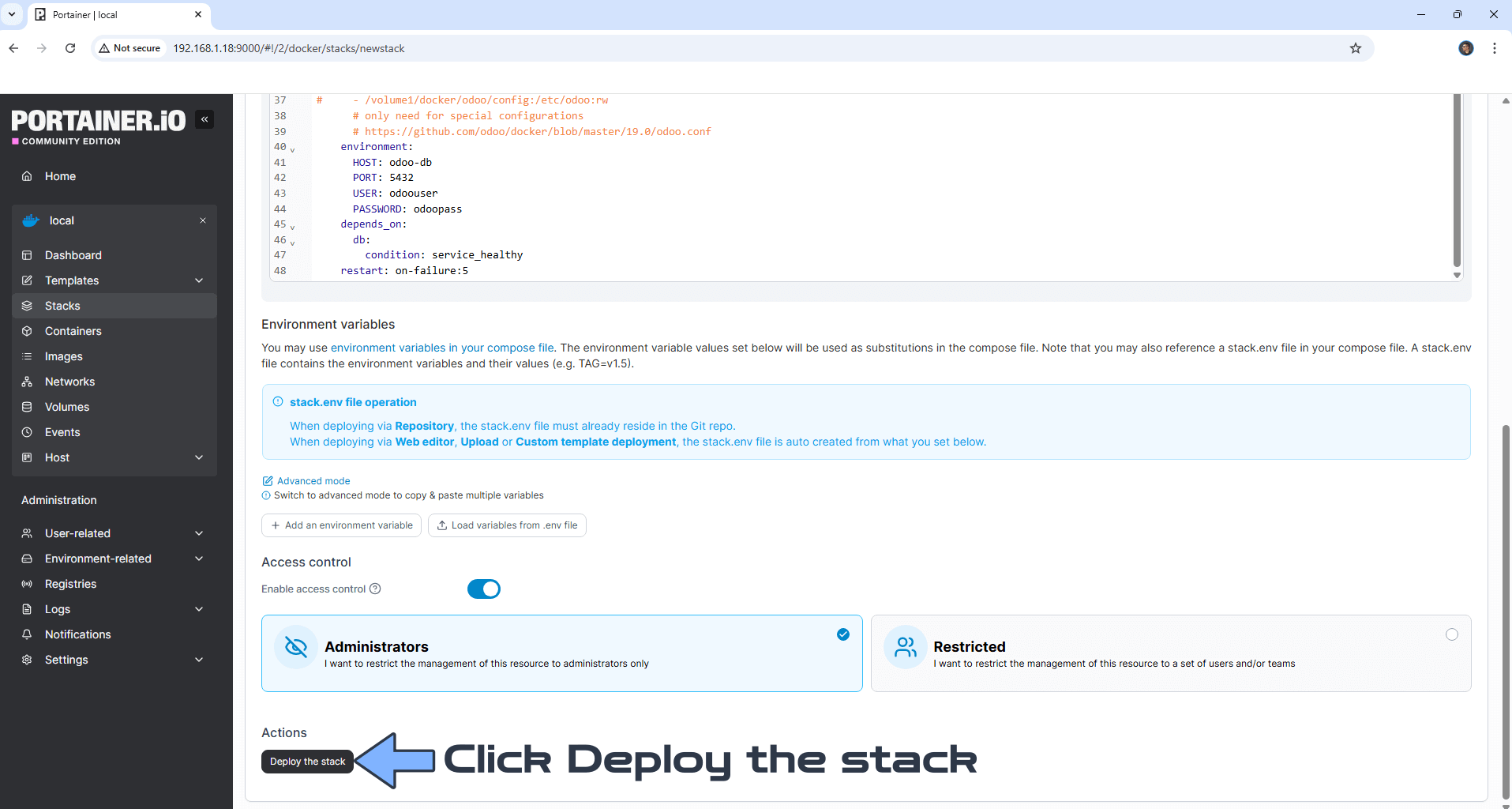
STEP 15
If everything goes right, you will see this message at the top right of your screen: “Success Stack successfully deployed“.

STEP 16
🟢Please Support My work by Making a Donation. Almost 99,9% of the people that install something using my guides forget to support my work, or just ignore STEP 1. I’ve been very honest about this aspect of my work since the beginning: I don’t run any ADS, I don’t require subscriptions, paid or otherwise, I don’t collect IPs, emails, and I don’t have any referral links from Amazon or other merchants. I also don’t have any POP-UPs or COOKIES. I have repeatedly been told over the years how much I have contributed to the community. It’s something I love doing and have been honest about my passion since the beginning. But I also Need The Community to Support me Back to be able to continue doing this work.
STEP 17
Now open your browser and type in your HTTPS/SSL certificate like this https://odoo.yourname.synology.me that you have previously created at STEP 6. In my case it’s https://odoo.mariushosting.synology.me then type in the following:
- Type in your automatically generated Master Password.
- Type in a random name for your database.
- Type in your Email.
- Type in a random Password.
- Type in your Phone number.
- Select your Language.
- Select your Country.
- Click Create database.
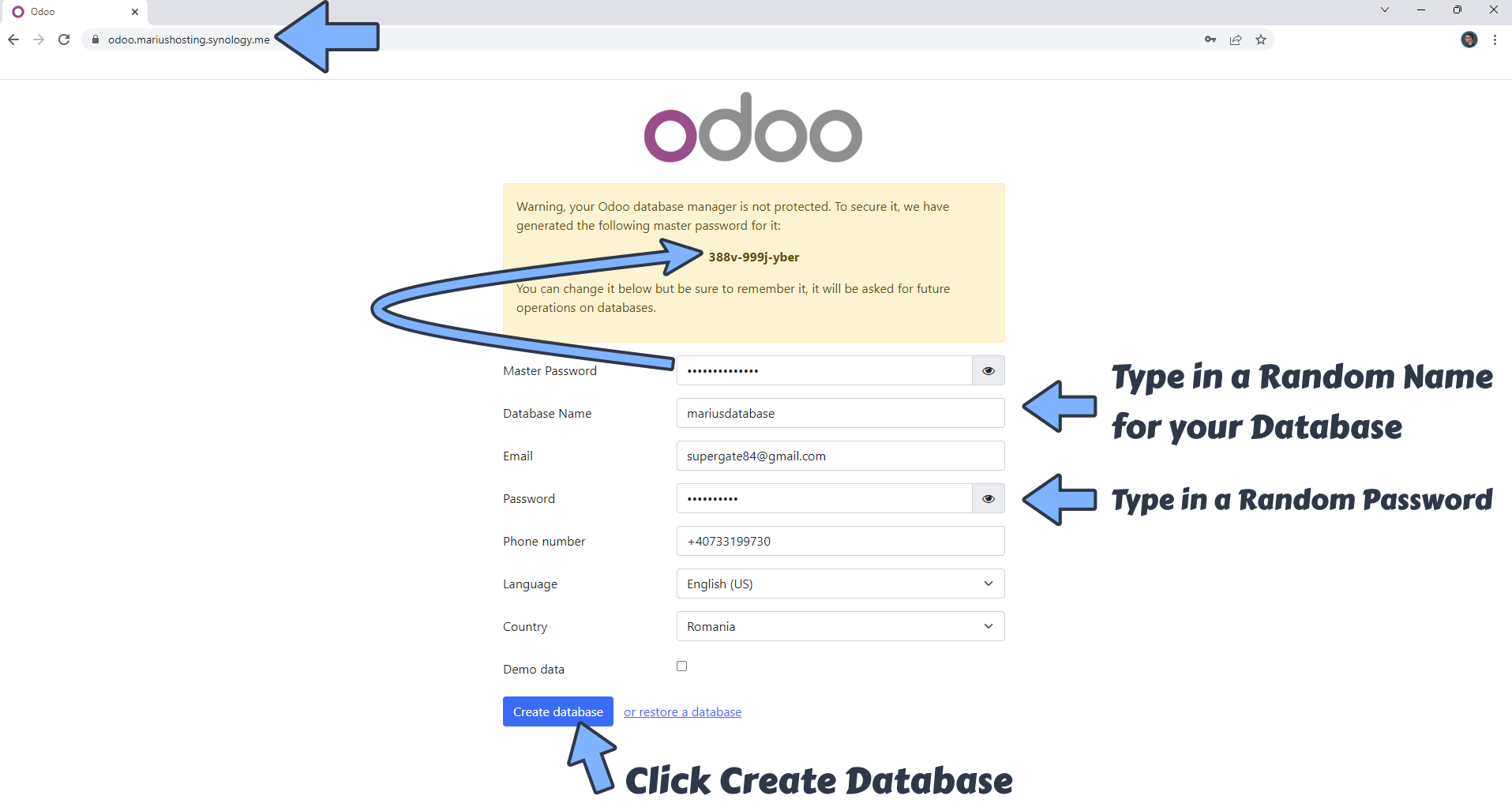
STEP 18
After you click Create database wait a few minutes until the database is created. After the database is created, you will be prompted to type in your own Email and Password that you have previously created at STEP 17. Click Log in. Follow the instructions in the image below.
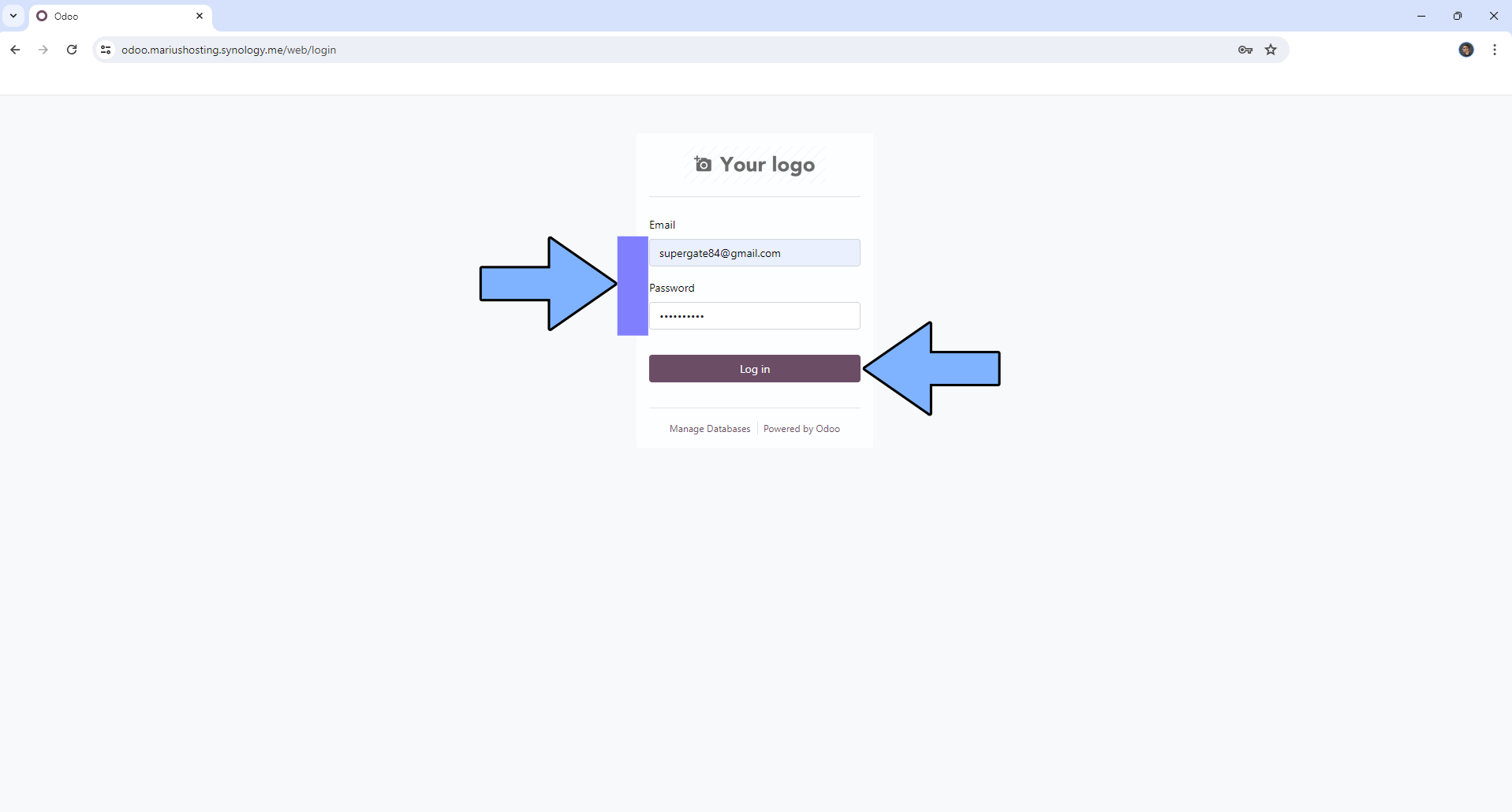
STEP 19
Your Odoo dashboard at a glance!
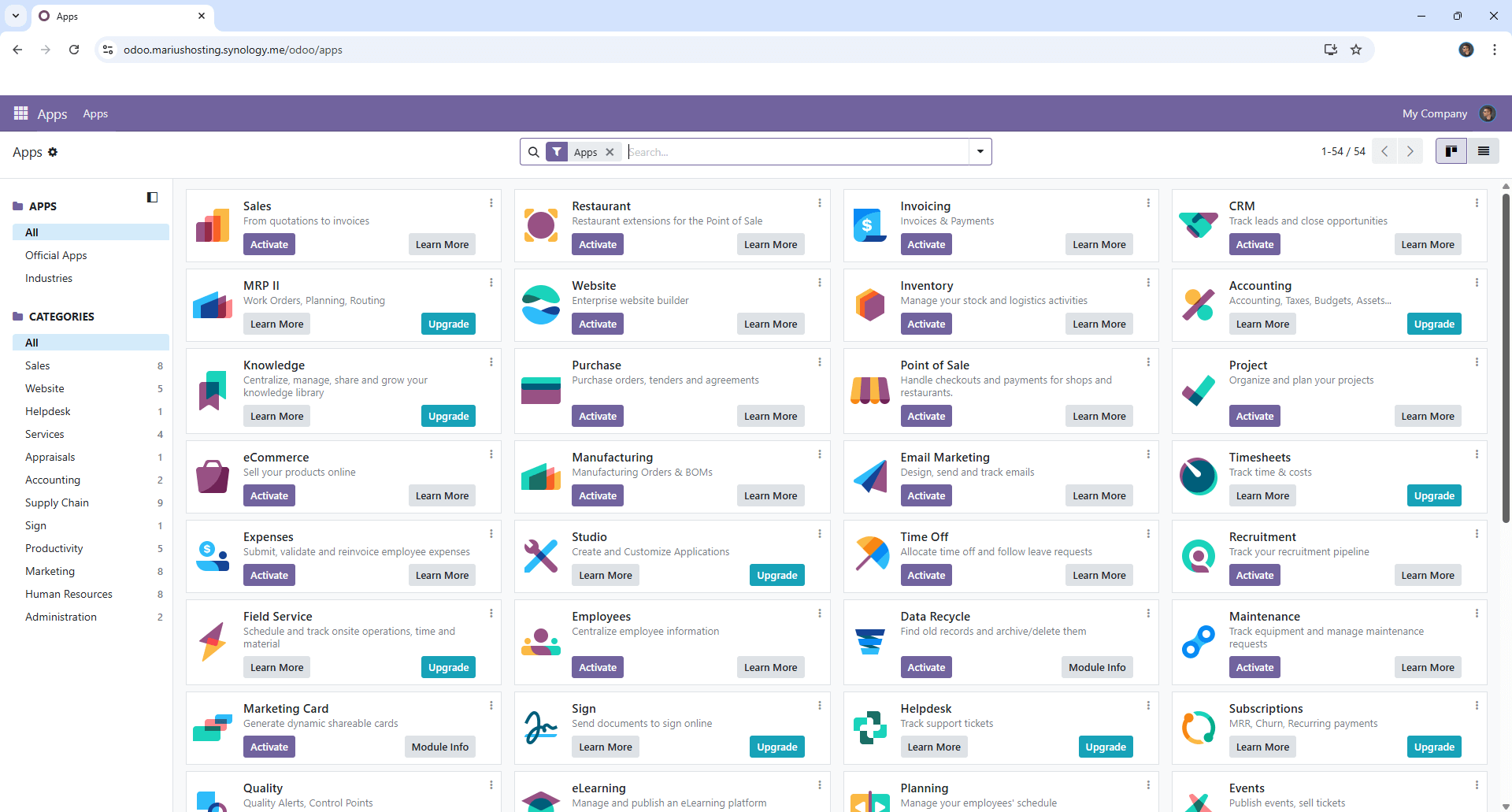
STEP 20
Below I will show you how to install the Python library on Odoo which is necessary for the OnlyOffice and Frepple addon. On the left sidebar in Portainer, click Containers. Identify your Odoo instance, then click on the little terminal icon. Follow the instructions in the image below.
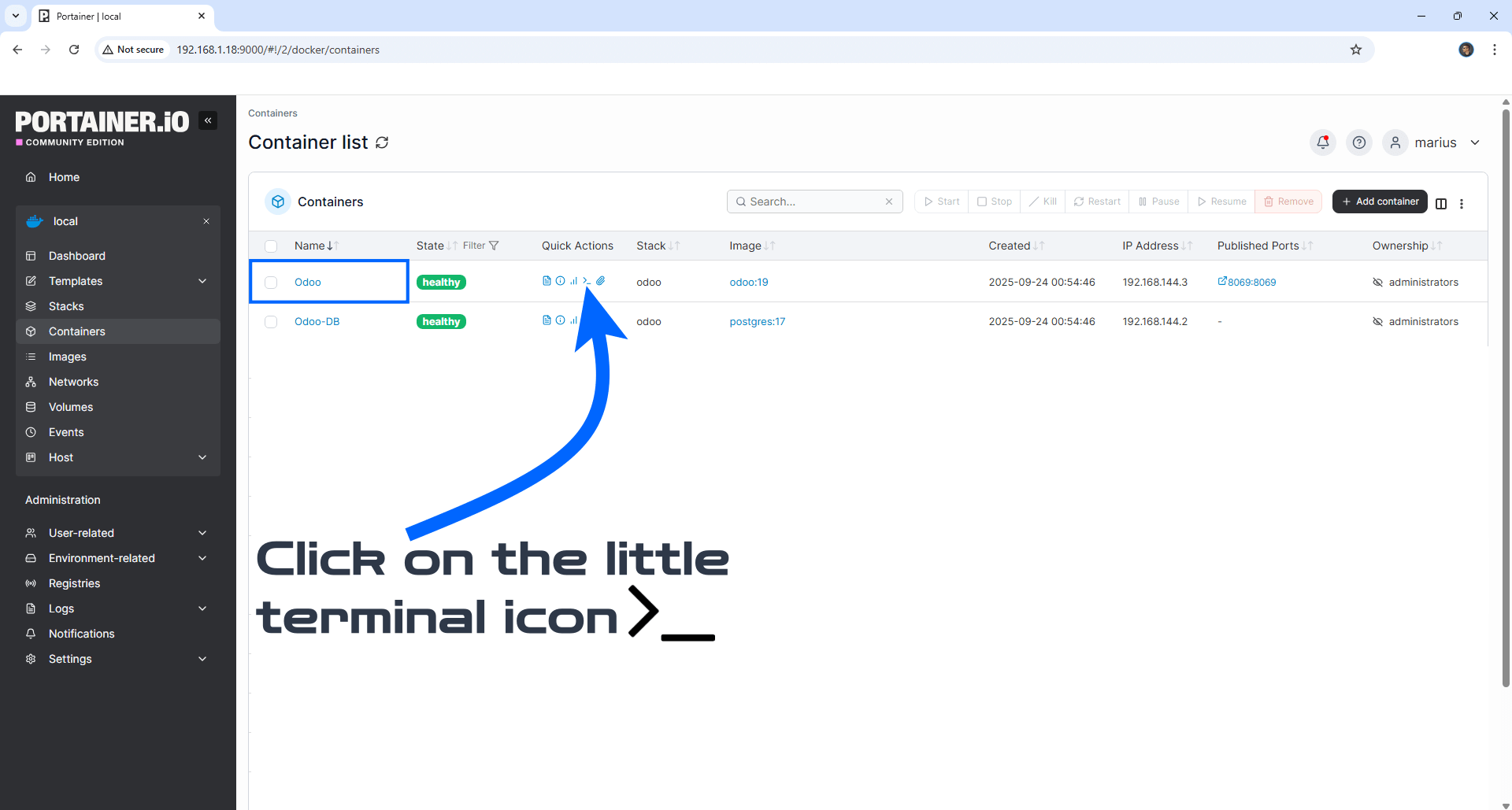
STEP 21
After you click on the little terminal icon at STEP 20, a new page will open. Click Connect. Follow the instructions in the image below.
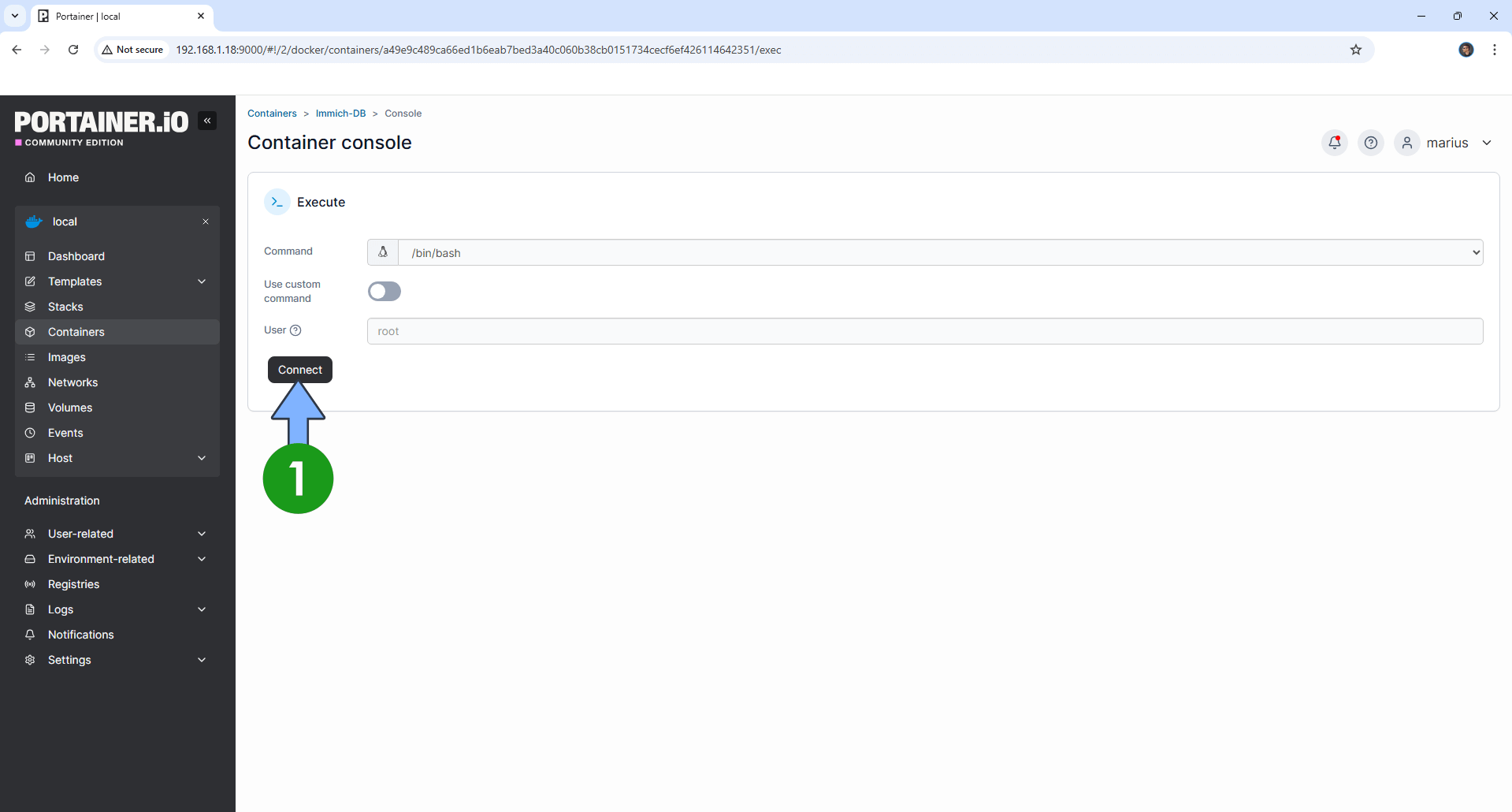
STEP 22
After you click Connect at STEP 21, a Console will open. Copy Paste the code below in the console.
pip install pyjwt --break-system-packages
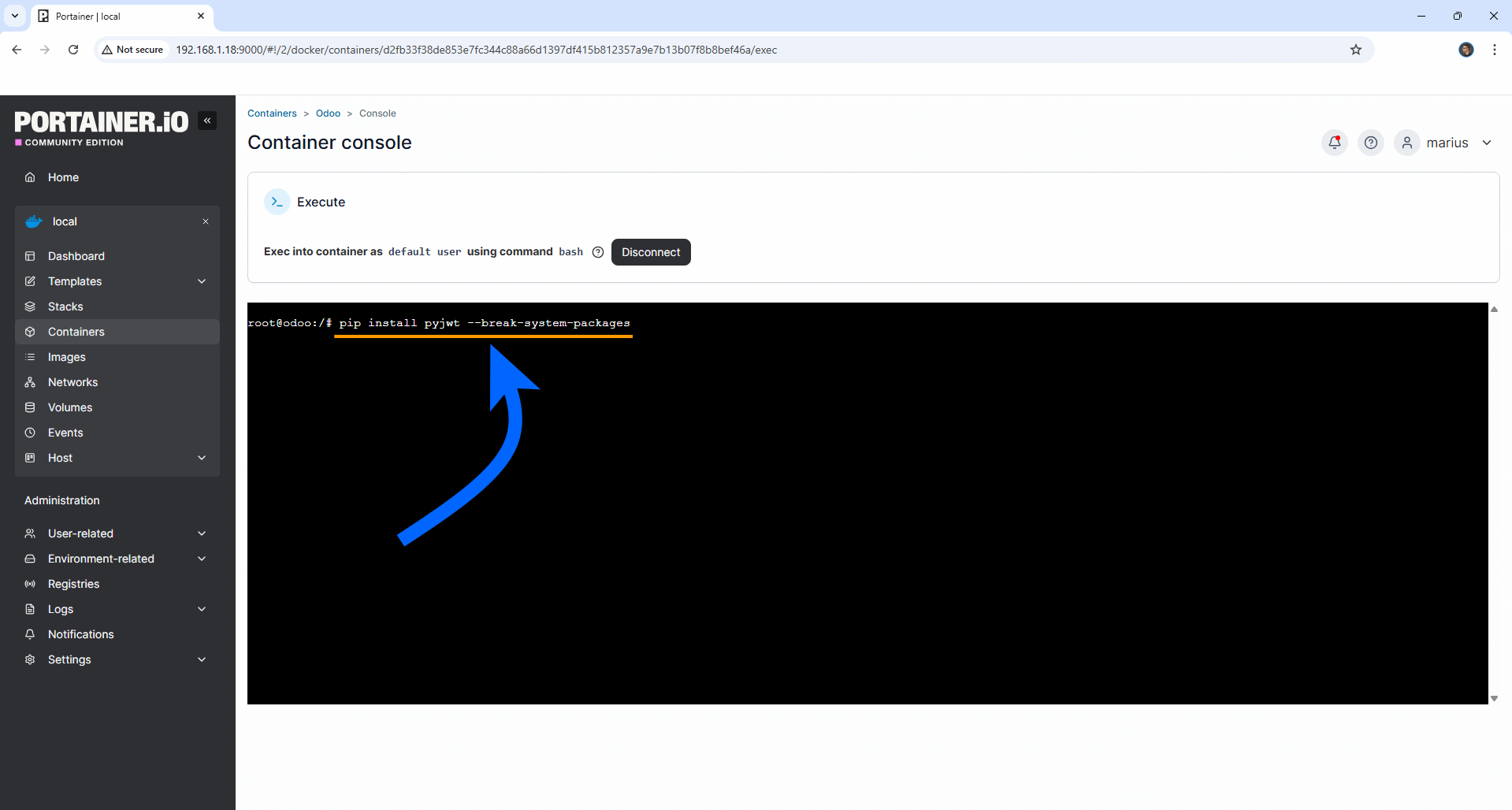
STEP 23
Once the code is inserted, confirm by pressing Enter on your keyboard to start the Python installation process. You will see the following message: Successfully installed pyjwt-2.10.1.
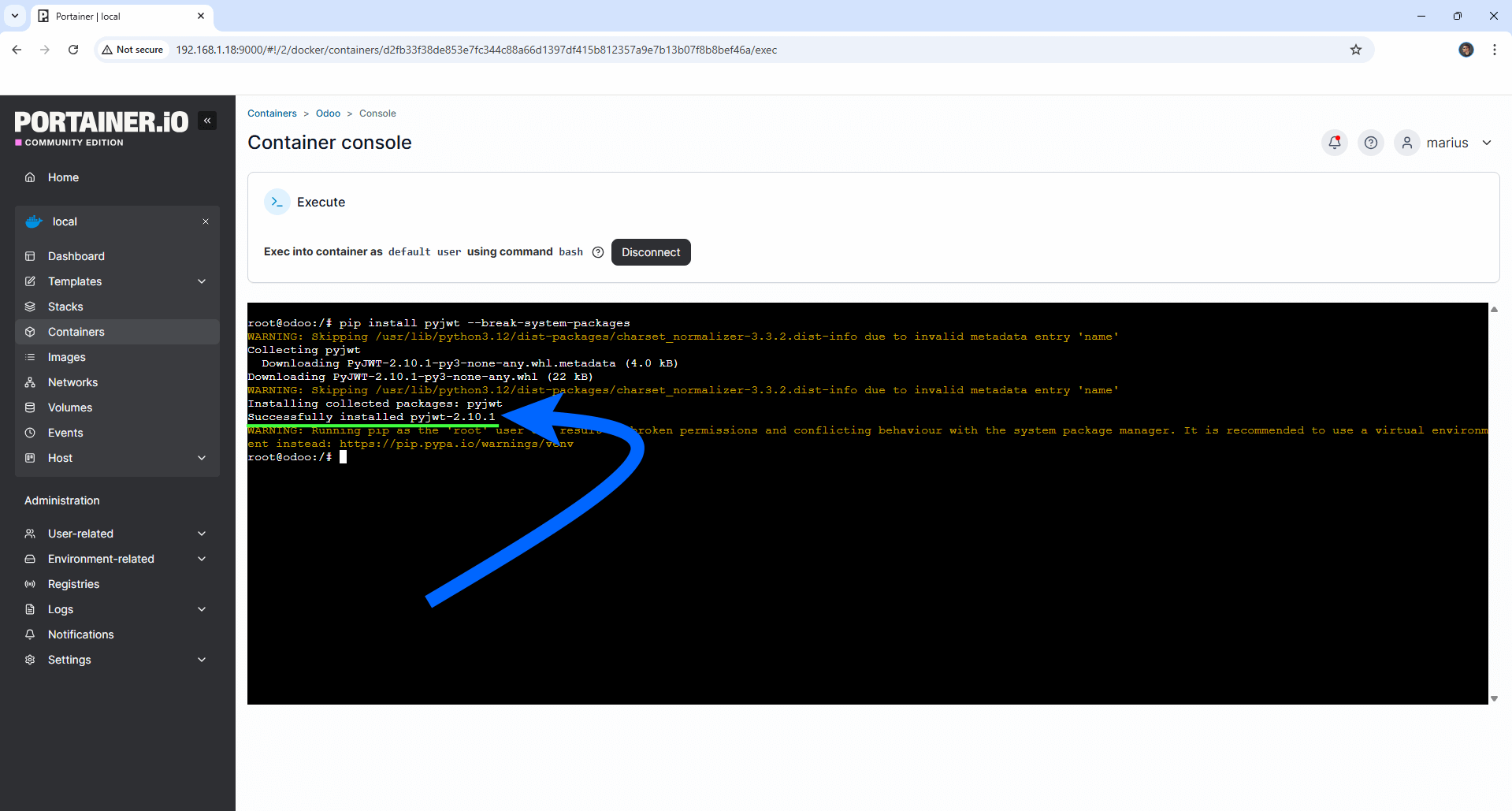
STEP 24
On the left sidebar in Portainer, click Containers. Identify your Odoo instance, select it then click Restart. Follow the instructions in the image below.
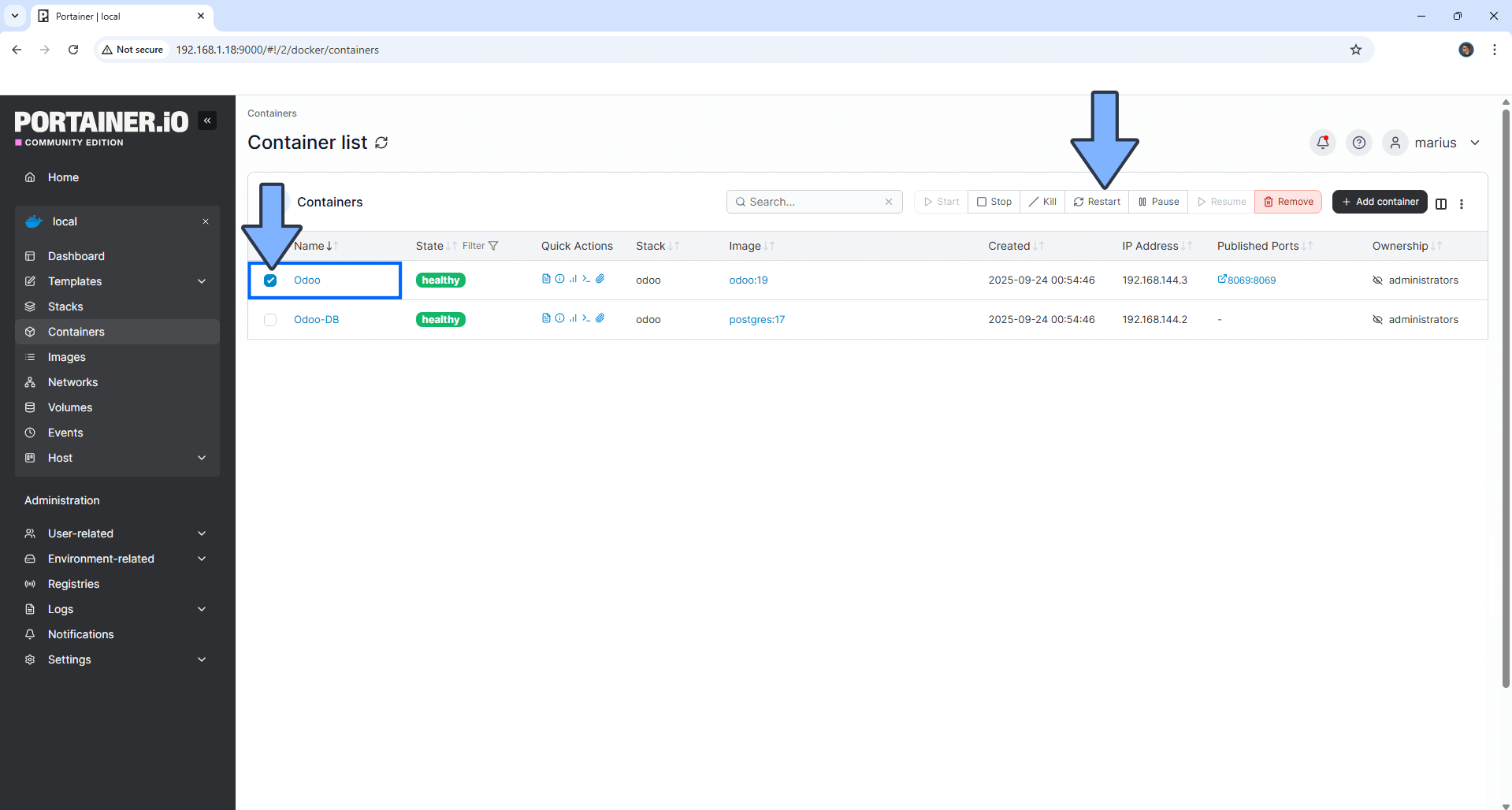
Enjoy your Odoo!
If you encounter issues by using this container, make sure to check out the Common Docker issues article.
Note: Can I run Docker on my Synology NAS? See the supported models.
Note: How to Back Up Docker Containers on your Synology NAS.
Note: Find out how to update the Odoo container with the latest image.
Note: How to Free Disk Space on Your NAS if You Run Docker.
Note: How to Schedule Start & Stop For Docker Containers.
Note: How to Activate Email Notifications.
Note: How to Add Access Control Profile on Your NAS.
Note: How to Change Docker Containers Restart Policy.
Note: How to Use Docker Containers With VPN.
Note: Convert Docker Run Into Docker Compose.
Note: How to Clean Docker.
Note: How to Clean Docker Automatically.
Note: Best Practices When Using Docker and DDNS.
Note: Some Docker Containers Need WebSocket.
Note: Find out the Best NAS Models For Docker.
Note: Activate Gmail SMTP For Docker Containers.
This post was updated on Friday / September 26th, 2025 at 11:08 PM
